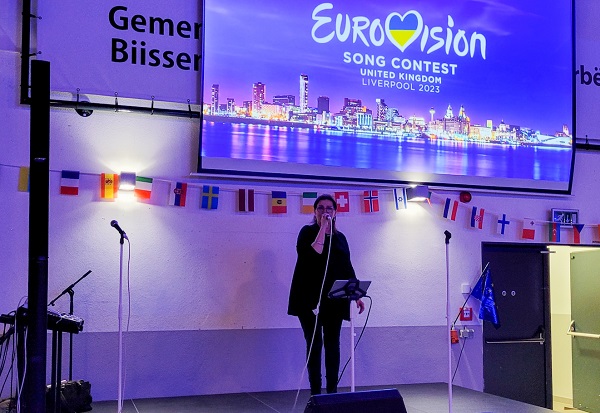 Marion Welter, who represented Luxembourg at Eurovision in 1992, performs at the OGAE Luxembourg Eurovision Preview Night in Bissen on 21 April 2023;
Credit: Jazmin Campbell, Chronicle.lu
Marion Welter, who represented Luxembourg at Eurovision in 1992, performs at the OGAE Luxembourg Eurovision Preview Night in Bissen on 21 April 2023;
Credit: Jazmin Campbell, Chronicle.lu
After more than three decades of absence, Luxembourg stepped back into the Eurovision spotlight in 2024: Tali’s energetic performance of “Fighter” secured 13th place in the final that year in Malmö, Sweden.
One year later, at the Eurovision Song Contest (ESC) 2025 in Basel, Switzerland, it was Laura Thorn’s turn to represent the Grand Duchy, with “La Poupée Monte Le Son” - a nod to France Gall’s winning Eurovision entry for Luxembourg 60 years earlier, in 1965.
As a child, I watched Eurovision each year with family - it was a fun tradition that faded after I "flew the nest". Like many viewers in the United Kingdom, I grew up listening to the tongue-in-cheek commentary of the late Terry Wogan on the BBC - a role carried on with wit and enthusiasm by Graham Norton. My childhood interest in Eurovision was renewed in April 2023, when I attended an ESC preview night in Bissen, partly for work but also for the sake of nostalgia. Just a few weeks later, Luxembourg officially announced its anticipated return to Eurovision. As a journalist, I had the opportunity to attend the 2024 Luxembourg Song Contest, where Tali was selected as the first artist to represent the country at the ESC since 1993. This year, I joined one of several Eurovision watch parties held in Luxembourg City for the 17 May final. These events were lively and enjoyable, although Eurovision is not quite how I remembered it - and the contest today is not without its share of controversy.
Origins of ESC & Luxembourg’s Participation
The very first ESC also took place in Switzerland, back in May 1956. Only seven countries competed: Luxembourg, Switzerland, the Netherlands, Belgium, Germany, France and Italy. Each nation submitted two songs and Switzerland’s Lys Assia ultimately won the contest with “Refrain”, her second entry, sung in French.
Over the years, the contest has evolved significantly. Since 1957, participating countries have been limited to one entry each. Rules requiring songs be performed in an official language of the respective countries have been relaxed, as have restrictions on the number of on-stage performers.
According to Eurovision, the ESC began as a pan-European “technical experiment in television broadcasting”. The Eurovision network, operated by the European Broadcasting Union (EBU), began airing its first programmes in 1954; its most famous programme would become the Eurovision Song Contest.
Between 1956 and 1993, Luxembourg participated in every edition of the ESC - except in 1959. The country won five times. Jean-Claude Pascal secured the Grand Duchy’s first victory in 1961 with “Nous Les Amoureux”. France Gall was the next contestant to win for Luxembourg, with “Poupée de Cire, Poupée de Son” in 1965 - a song echoed exactly 60 years later in Laura Thorn’s 2025 entry. Luxembourg also won Eurovision two years in a row, in 1972 and 1973, with Vicky Leandros’ “Après Toi” and Anne-Marie David’s “Tu Te Reconnaîtras”. Its fifth and final win (to date) came in 1983, with Corinne Hermès’ “Si la Vie est Cadeau”.
After a disappointing result in 1993, Luxembourg was relegated and barred from participating in 1994. The country opted not to return in 1995, partly due to financial reasons, and this marked the start of a 31-year absence. The long-awaited comeback in 2024 brought renewed excitement, with Tali advancing to the final and finishing a respectable 13th. Laura Thorn secured Luxembourg a spot again in this year’s final but placed 23rd. Despite the nostalgia and enthusiasm over its Eurovision return, Luxembourg’s next win may still be a way off.
Political Voting & Controversies
Only members of the EBU (or invited associates) are eligible to participate in the ESC. Despite the name “Eurovision”, membership has long extended beyond the traditional geographical boundaries of Europe. Israel first joined the contest in 1973, with other non-European countries following suit. In 2015, Australia was invited to participate as a special guest and returned in subsequent years as a full member.
According to its organisers, the ESC is “a long running non-political, entertainment event which is designed to bring audiences and countries together”. However, the contest has not escaped political debate - from questions about the eligibility of participating (non-European) countries to criticism of the voting system.
In 2022, Russia - an ESC participant since 1994 - was excluded from the contest following its full-scale invasion of Ukraine. Although the EBU claimed the decision was based on its rules and values rather than politics, the move sparked debate. Many would later question why Israel was still allowed to participate, amid the escalating conflict with Gaza following the Hamas attacks of 7 October 2023. Such decisions have fuelled accusations of double standards - can Eurovision truly claim to be apolitical?
The 2024 contest was overshadowed by this controversy, with protests erupting over Israel’s inclusion. Despite organisers’ efforts to de-escalate tensions, demonstrations and calls for a boycott resurfaced in 2025. In early May, more than 70 former ESC contestants signed an open letter urging the EBU to exclude Israel. This year’s Eurovision winner, JJ from Austria, has also called for Israel to be excluded from next year’s contest.
When Yuval Raphael (a survivor of the 7 October attacks) secured second place for the country in the final, accusations of vote-rigging emerged. Spanish and Belgian broadcasters formally raised their concerns with the EBU after Israel dominated the public vote: despite receiving zero points from the two national juries, Israel received the maximum 12 points from televoters in both countries. Broadcasters in Ireland, the Netherlands, Iceland and Finland have voiced similar concerns over the public vote. Meanwhile, Spain's RTVE now faces a fine for airing a pro-Palestine message during the ESC 2025 broadcast.
Critics have argued that the current voting system is vulnerable to manipulation: viewers can vote up to 20 times per device or credit card for a small fee, thus raising concerns over fairness, transparency and whether the results reflect genuine public sentiment.
Long-standing frustrations over the jury/public divide came to a head in 2022, when “irregular” voting patterns were identified among six countries’ national juries. This led to a major rule change: from 2023 onwards, only the televote (public vote) determines who advances from the semi-finals. In the final, both the juries and televoters award their own set of points.
Another enduring criticism of Eurovision’s voting system is the tendency for neighbouring or politically aligned countries to award each other high points - again calling into question the apolitical (and musical merit-based) nature of the contest. Greece and Cyprus, for example, are known for exchanging top points; Nordic countries also often support each another, as do several other neighbouring nations. While such patterns may reflect cultural or linguistic ties, one may argue that they reinforce geopolitical alliances and undermine the concept of merit-based competition.
Other controversies include disqualifications, such as that of Dutch contestant and favourite Joost Klein in 2024 after an alleged backstage incident, and ongoing debates over LGBTQI+ representation. Some have also questioned the fairness of the “Big Five” - Germany, Italy, UK, France and Spain - automatically qualifying for the final due to their significant financial contributions. This privilege also applies to the previous year’s winner. Nevertheless, automatic qualification offers neither guarantee of success nor protection from public embarrassment - as the UK knows all too well, having earned the dreaded “nul points” more than once.
Future of Eurovision
Despite its mission to unite nations through music (while remaining apolitical), Eurovision has often found itself entangled in division and debate. From geopolitical tensions and bloc voting to doubts over transparency, the contest reflects not only the cultural diversity of Europe (and beyond) but also the underlying political and social issues that shape our world.
For countless fans, including many in the LGBTQI+ community, Eurovision remains a beloved celebration. It also allows smaller nations such as Luxembourg to “dream big” - even if another victory currently remains out of our grasp. Yet with controversies mounting, the contest's claim to neutrality is under threat, and its future feels uncertain. As Eurovision prepares to head to Austria in 2026, one question lingers: can it remain (if it ever truly was) a unifying cultural event in an increasingly divided world?









